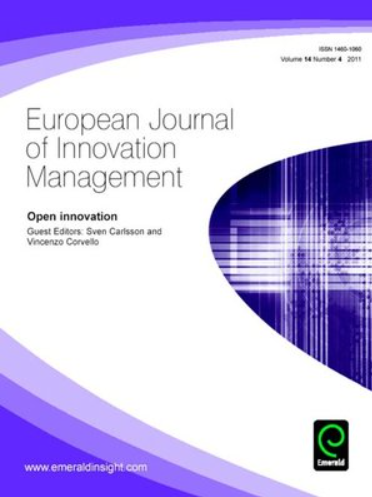Can digital transformation improve the quality of enterprise innovation in China?
IF 5.7
3区 管理学
Q1 BUSINESS
引用次数: 0
Abstract
Purpose Digital transformation and innovation-driven development have become an international consensus. The purpose of this paper is to examine the effects of relationships, mechanisms and economic consequences between digital transformation and enterprise innovation quality in order to provide a benchmark for developing countries to implement digital transformation strategies and innovation-driven strategies and provide a major support for economic recovery in the post-coronavirus disease 2019 (COVID-19) era. Design/methodology/approach Using microdata from A-share listed enterprises in Shanghai and Shenzhen from 2010 to 2021, this study examines the relationship between digital transformation and enterprise innovation quality and further reveals the internal logic and economic consequences of digital transformation to improve enterprise innovation quality through the mediating effect and moderating effect models. Findings The results demonstrate that digital transformation is beneficial for improving enterprise innovation quality. The heterogeneity test demonstrates that digital transformation has a larger effect on improving enterprise innovation quality in non-state-owned enterprises and eastern enterprises in China. The mechanism test demonstrates that digital transformation can improve enterprise innovation quality by improving internal control quality and analyst attention. Furthermore, with the increase in enterprise innovation inputs, digital transformation plays a significantly stronger role in improving enterprise innovation quality. The extended analysis demonstrates that digital transformation can significantly improve enterprise financial performance by improving innovation quality. Research limitations/implications First, the construction of the core explanatory variable digital transformation index in this study is based on the Python data analysis software, which calculates the frequency of digital transformation in the text of the business situation analysis portion of the annual report of the listed companies and then obtains the degree of digital transformation of the company in this year. There may be some deviation from the degree of digital transformation in the actual production and operation of enterprises. Second, in addition to internal control quality and analyst attention, are there other mediating mechanisms for the impact of digital transformation on the quality of enterprise innovation? Third, whether the moderating effect of innovation input on digital transformation and innovation quality is related to human capital factors of the research and development (R&D) team, such as the technical background of R&D personnel, etc. Originality/value This study enriches the relevant theories of digital transformation and broadens the research boundaries of digital transformation and enterprise innovation. This study's result provides an empirical basis for enterprises to improve enterprise innovation quality and financial performance from the perspective of digital transformation at the micro level and points out specific practical directions, combining theory with practice.数字化转型能否提高中国企业创新质量?
数字化转型和创新发展已成为国际共识。本文旨在研究数字化转型与企业创新质量之间的关系、机制和经济后果的影响,为发展中国家实施数字化转型战略和创新驱动战略提供基准,并为后冠状病毒病2019 (COVID-19)时代的经济复苏提供重要支持。本研究利用2010 - 2021年沪深两市a股上市企业的微观数据,考察了数字化转型与企业创新质量的关系,并通过中介效应和调节效应模型进一步揭示了数字化转型提升企业创新质量的内在逻辑和经济后果。研究结果表明,数字化转型有利于提高企业创新质量。异质性检验表明,数字化转型对中国非国有企业和东部地区企业创新质量的提升作用更大。机制检验表明,数字化转型可以通过提高内部控制质量和分析师关注度来提高企业创新质量。随着企业创新投入的增加,数字化转型对企业创新质量的提升作用显著增强。扩展分析表明,数字化转型可以通过提高创新质量显著改善企业财务绩效。首先,本研究的核心解释变量数字化转型指数的构建是基于Python数据分析软件,通过计算上市公司年报经营状况分析部分文本中数字化转型的频率,从而得出该公司这一年的数字化转型程度。企业在实际生产经营中,数字化转型的程度可能存在一定偏差。第二,除了内部控制质量和分析师关注外,数字化转型对企业创新质量的影响还有其他中介机制吗?第三,创新投入对数字化转型和创新质量的调节作用是否与研发团队的人力资本因素(如研发人员的技术背景等)有关。本研究丰富了数字化转型的相关理论,拓宽了数字化转型与企业创新的研究边界。本研究结果为企业在微观层面上从数字化转型的角度提升企业创新质量和财务绩效提供了实证依据,并指出了具体的实践方向,理论与实践相结合。
本文章由计算机程序翻译,如有差异,请以英文原文为准。
求助全文
约1分钟内获得全文
求助全文
来源期刊
CiteScore
10.40
自引率
17.60%
发文量
107
期刊介绍:
The subject of innovation is receiving increased interest both from companies because of their increased awareness of the impact of innovation in determining market success and also from the research community. Academics are increasingly beginning to place innovation as a priority area in their research agenda. This impetus has been partly fuelled by the Economic & Social Research Council (ESRC) who have designated innovation as one of nine research areas in their research initiative schemes.

 求助内容:
求助内容: 应助结果提醒方式:
应助结果提醒方式:


